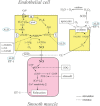Aldosterone affects blood flow and vascular tone regulated by endothelium-derived NO: therapeutic implications
- PMID: 23190073
- PMCID: PMC3579277
- DOI: 10.1111/j.1476-5381.2012.02194.x
Aldosterone affects blood flow and vascular tone regulated by endothelium-derived NO: therapeutic implications
Abstract
Aldosterone, in doses inappropriate to the salt status, plays an important role in the development of cardiovascular injury, including endothelial dysfunction, independent of its hypertensive effects. Acute non-genomic effects of aldosterone acting on mineralocorticoid receptors are inconsistent in healthy humans: vasoconstriction or forearm blood flow decrease via endothelial dysfunction, vasodilatation mediated by increased NO actions, or no effects. However, in studies with experimental animals, aldosterone mostly enhances vasodilatation mediated by endothelium-derived NO. Chronic exposure to aldosterone, which induces genomic responses, results in impairments of endothelial function through decreased NO synthesis and action in healthy individuals, experimental animals and isolated endothelial cells. Chronic aldosterone reduces NO release from isolated human endothelial cells only when extracellular sodium is raised. Oxidative stress is involved in the impairment of endothelial function by promoting NO degradation. Aldosterone liberates endothelin-1 (ET-1) from endothelial cells, which elicits ET(A) receptor-mediated vasoconstriction by inhibiting endothelial NO synthesis and action and through its own direct vasoconstrictor action. Ca(2+) flux through T-type Ca(2+) channels activates aldosterone synthesis and thus enhances unwanted effects of aldosterone on the endothelium. Mineralocorticoid receptor inhibitors, ET(A) receptor antagonists and T-type Ca(2) + channel blockers appear to diminish the pathophysiological participation of aldosterone in cardiovascular disease and exert beneficial actions on bioavailability of endothelium-derived NO, particularly in resistant hypertension and aldosteronism.
© 2012 The Authors. British Journal of Pharmacology © 2012 The British Pharmacological Society.
Figures


References
-
- Amiri F, Virdis A, Neves MF, Iglarz M, Seidah NG, Touyz RM, et al. Endothelium-restricted overexpression of human endothelin-1 causes vascular remodeling and endothelial dysfunction. Circulation. 2004;110:2233–2240. - PubMed
-
- Andreis PG, Neri G, Tortorella C, Aragona F, Rossi GP, Nussdorfer GG. Mechanisms transducing the aldosterone secretagogue signal of endothelins in the human adrenal cortex. Peptides. 2002;23:561–566. - PubMed
-
- Arima S. Aldosterone and the kidney: rapid regulation of renal microcirculation. Steroids. 2006;71:281–285. - PubMed
-
- Arima S, Kohagura K, Xu HL, Sugawara A, Abe T, Satoh F, et al. Nongenomic vascular action of aldosterone in the glomerular microcirculation. J Am Soc Nephrol. 2003;14:2255–2263. - PubMed
Publication types
MeSH terms
Substances
LinkOut - more resources
Full Text Sources
Other Literature Sources
Miscellaneous

